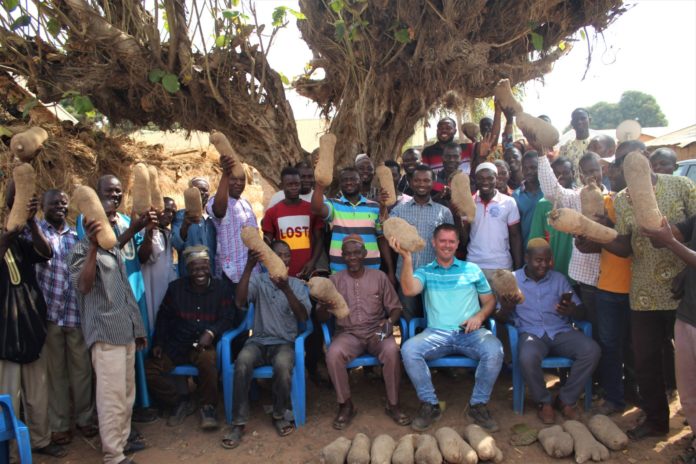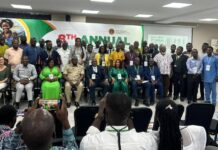Ghana is likely to be hit by hunger strikes due to the high cost of agro-inputs, climate change, and improper patronage of improved seeds by the farmers. These factors have increased costs of food production leading to price hikes of food commodities in Ghana.
In an answer to that and to minimize crop loss and improve food security in Ghana, the YIIFSWA II project from the IITA institute in Ibadan in collaboration with CSIR-CRI and CSIR-SARI and Plant Protection and Regulatory Service Directorate (PPRSD) under the Ministry of Food and Agriculture and Iribov Ghana have developed a new technology to produce improved seed yam and also introduced a new yam variety called Kpamyo by providing disease and virus free and high yielded yam seed of this variety to the farmers.
On the demonstration days at Buya, Bimbila, Wulensi, Senyai, Kpasa, and Nkwanta in the Northern and Oti region of Ghana, Kees Veldhuijzen, the Business Development Manager of Iribov Ghana from Sogakope explained that the circulating system of planting yam seeds by the farmers keep the diseases and virus in the system thereby contributing to low production.
“Farmers grow from their previous yields so they circulate the seeds and this is called ‘Farmers Saved Seed System’, and the problem of this system is that if there is any disease or virus in the yam, it will remain in the system like a circle which will not be omitted out”, Veldhuijzen said.
To make good use of the technology available in agriculture, Veldhuijzen explained that tissue culture technology was used to clean the plant materials from any diseases and viruses by Meristem culture. The disease and virus-free tissue plants are then propagated in a nursery to give the vines and the vines are used to make vine cuttings which are used to grow into a seed tuber in the field.
Explaining the new technology to the farmers, Veldhuijzen said there is a tissue culture laboratory and nursery operation to produce propagated plants via tissue culture and advanced nursery technology. The technology is used to clean the plant materials from diseases and viruses thereby improving the seeds. However, Iribov Ghana is working also on the existing yam varieties like Pona, Labariko, Nyamenti, and Olondor to improve their seeds by using this technology.
According to him, the tissue culture technology gives the improved yam seeds almost 100% germination, “instead of 60 or 70% germination of the traditional yam seeds, the technology used; the tissue culture technology assures 100% disease and virus free germination, therefore, the farmer is assured of full recovery of output”.
Skeptically, a farmer asked if the technology that was used to improve the new yam seeds is not GMO. He answered, “When many farmers hear about technology and laboratory, and taking off the disease and virus they think is GMO, but NO. The technology we use is not GMO. GMO means there is a change in the variety that is not 100% natural, but this is the same yam seed that disease and virus have been taken out by the use of tissue culture technology”.
He urged the farmers to embrace the technology and patronize the improved yam seed to save money and improve productivity to promote food security and standard of living.
“The most important part of this improve seed is the high plant establishment together with the high yield as compared to the continuous replant of farmers’ saving seeds”, Mr. Kwabena Darkwa, Plant Breeder at CSIR, Savanna Agricultural Research Institute said.
He assured that even in poor soil conditions, the improved yam seed is assured of germination and high productivity. Farmers who believe in getting high yields on virgin farmland could get higher yields on their old farmlands with the Kpamyo seed variety.
He encouraged the farmers to cultivate the improved yam seed to increase their yields and income to improve their livelihood and assured of improving the rest of the local varieties like Pona, Dabiriko, Nyamenti, Olondor, and other yams by using the same technology to take off all diseases and viruses.
He urged the buyers, exporters, and consumers to patronize the new yam in the market as it has been tested and tastes good for all dishes including fufu.
RESPONSE FROM THE FARMERS ON THE NEW TECHNOLOGY AND NEW YAM VARIETY.
Attesting to the benefit of the technology to the farmers, Mr. Obrien Nyarko, the Regional Director of Agriculture, Oti region said technology has come to develop the agriculture sector, and what has been presented is an eye witness.
During the demonstration at Kpasa, he urged the farmers to embrace the tissue culture technology to enhance the improvement of other local yam varieties.
“As farmers, we need to adopt and adapt to new ways of doing things. We cannot continue to farm the way we have been doing. We need to embrace the technology that has been introduced into the sector like what is happening here; this is a technology that will improve our yields and better our lives”, Mr. Nyarko said.
The Kpandai district best farmer, Mr. Robert Gbanzaba, a yam farmer from Buya extolled the new yam variety for its germination percentage and the size of the tubers that emanated from planting such small yam seed.
“Last year Iribov Ghana came to this community to introduce the new variety for demonstration. We nearly rejected the seeds due to their tiny sizes as compared to the traditional yam seeds we use to grow, but most of the farmers said we should try and see the outcome. Some of us put 2 seeds in a mound and during the harvest we realized that the mound which contains 2 yam seeds is burst due to the huge size of the yam”, he testified.
He recommended Kpamyo yam variety seed to all farmers to grow for quality and quantity production to feed the country and improve their standard of living. He also is looking forward to the moment Iribov Ghana will bring them the improved seed of their existing varieties like Pona and Nyamnti.
“What makes this yam seed different is that when you plant 100 pieces in a mound, you are assured of 100% germination that is completely different from our local yam seeds where sometimes you could plant 100 pieces, about 25 to 30 will die”, Hon. Iddrissu Abukari, Assemblyman for Masaaka electoral area, Bimbila North Municipality said. Hon. commended yam farmers to patronize the new variety since its tubers could be kept for a longer period without spoiling to meet the lean season.








